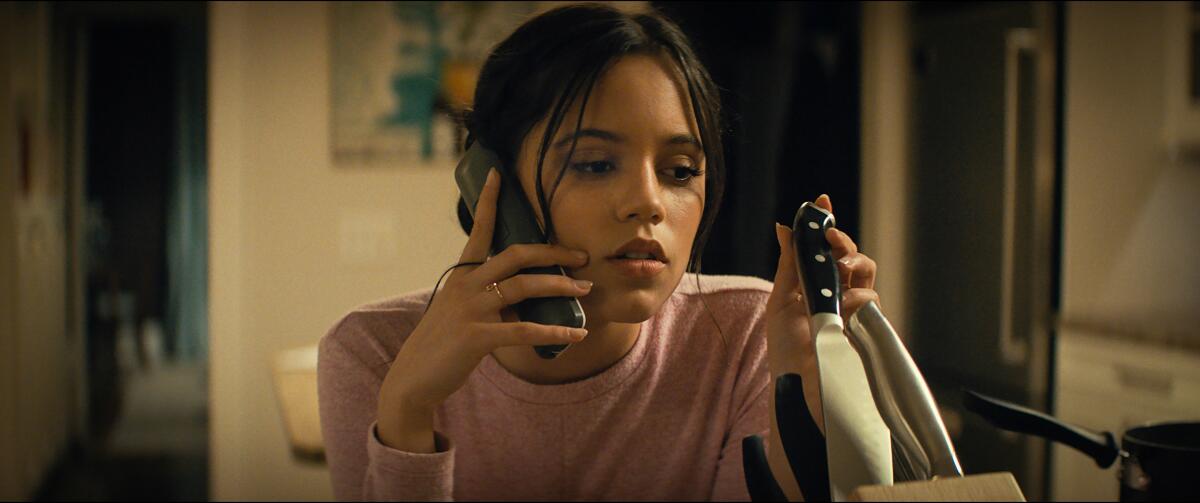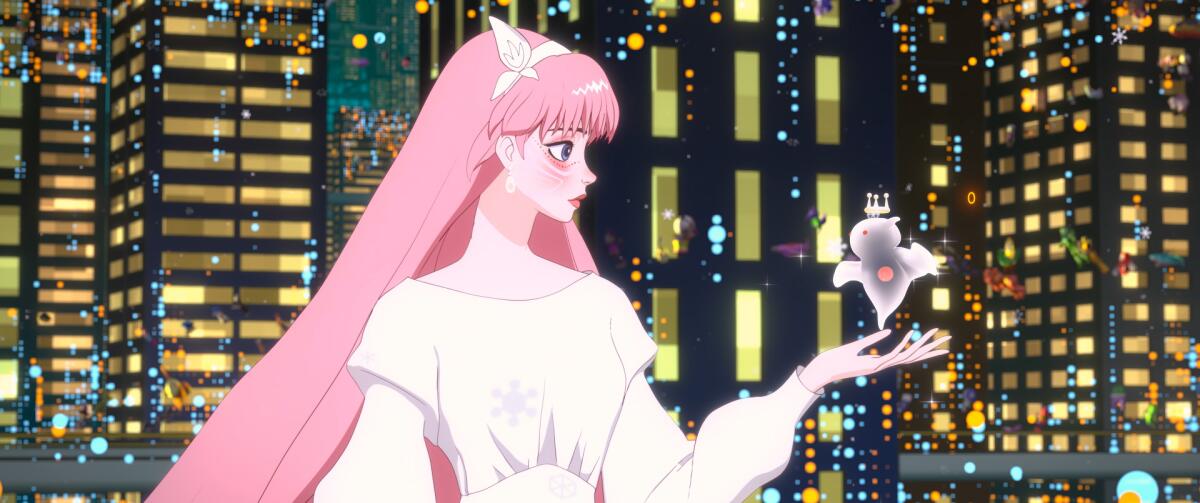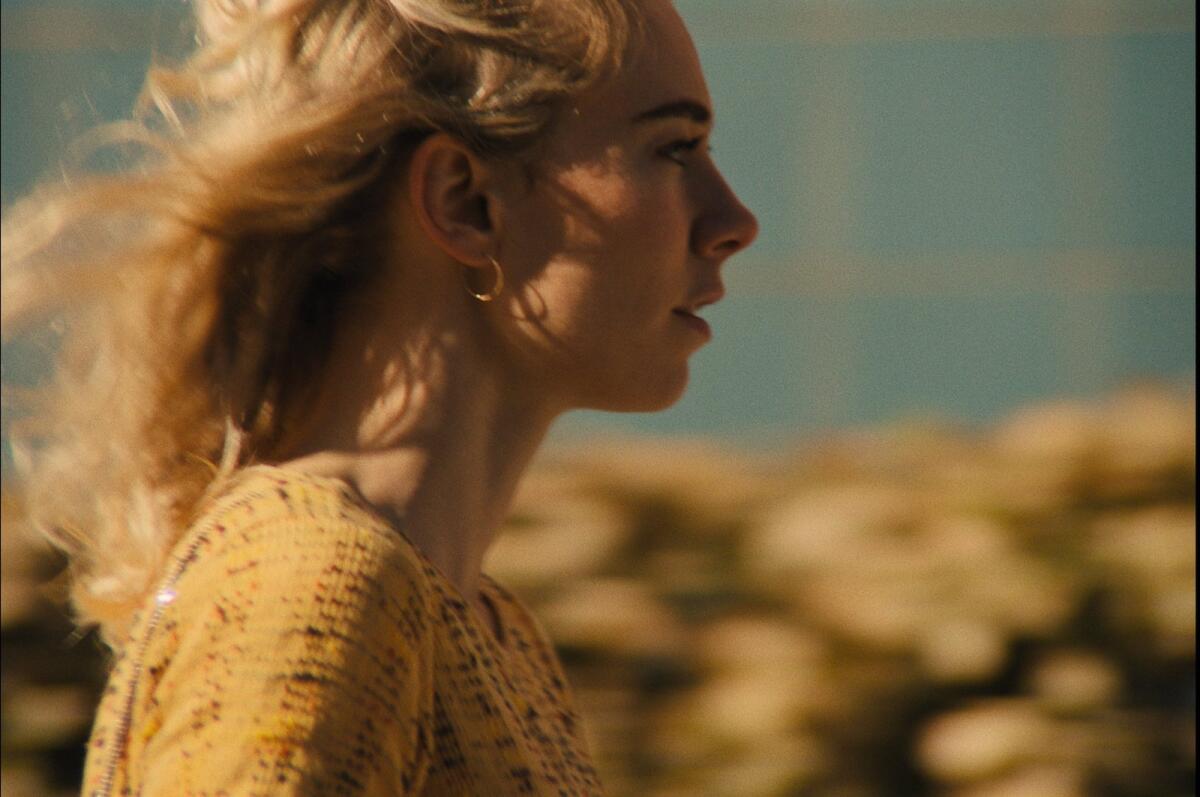In the new ‘Scream,’ the franchise is the star
Hello! I’m Mark Olsen. Welcome to another edition of your regular field guide to a world of Only Good Movies.
Only good movies
Get the Indie Focus newsletter, Mark Olsen's weekly guide to the world of cinema.
You may occasionally receive promotional content from the Los Angeles Times.
Last week’s newsletter was being put together as the news broke of Sidney Poitier’s death at age 94. In the subsequent week, The Times published a series of reflections on his life and work.
Greg Braxton wrote about what it was like to meet and interview Poitier. As Greg wrote, “My nerves were calmed by his quiet dignity. Although he was aware of his status as a screen icon, he was more personable — and down-to-earth — than many celebrities I’d met before, or have since. His smile and his voice were electric. He could not have been more polite.”
Mary McNamara and LZ Granderson both wrote personal remembrances of the direct impact Poitier’s life and work had on them.
Justin Chang dug deep into the meaning of his screen career, noting, “It would be reductive to suggest that Poitier’s career was some triumph of positivity over rage, or that he took an easy, forgiving attitude toward the industry that slowly and grudgingly made room for him. [It is possible to] explain some of the rich, complicated emotional and psychological layers you see in a Poitier performance. The anger is often there, but it isn’t all that’s there. Often it’s held in check by other qualities: playfulness, knowingness, sardonic wit, plaintive sorrow, a joy in being alive.”
Chris Vognar wrote about Poitier’s longtime friendship with Harry Belafonte. In a statement, Belafonte said, “For over 80 years, Sidney and I laughed, cried and made as much mischief as we could. He was truly my brother and partner in trying to make this world a little better. He certainly made mine a whole lot better.”
Michael Ordoña spoke to Phil Alden Robinson, who directed Poitier in the 1992 comedy “Sneakers.” As Alden recalled, “He taught me something wonderful one day. We were talking about one’s life in this profession. He said, ‘We pour our lives into our work as if from a cup. When the work’s over, you have to refill that cup. And you can’t refill it with work. You have to refill it with life.’ … He was such a great example in so many ways. I feel so incredibly lucky to have known him. He’s one of the handful of the people I think of: He wasn’t just a good man; he was a great man.”
I spoke to Jacqueline Stewart of the Academy Museum of Motion Pictures and Maya Cade from Black Film Archive about Poitier’s legacy in Hollywood. As Cade said, “Sidney’s legacy to the people who have come after him, I would say it’s the freedom to choose. They no longer had to be this perfection onscreen. People who came after him had the ability to be messy. They had the ability to be evil. They could be a villain. They could be complicated. They could not just be a foil to injustice. They could be the injustice, they could have this full embodiment of a person onscreen. When we think about his run of roles that we were all thinking and talking about, that is what his legacy means.”
Thinking about Poitier and what it meant for him to be the first Black man to win the Oscar for lead actor really brought into relief both the frivolity of a typical awards season and how it can have genuine meaning. Our awards coverage this week got into the good and the bad of the season so far, as Glenn Whipp and Matt Brennan took a look at this week’s SAG Awards nominations, while Stacy Perman and Christi Carras examined the sad spectacle of the Golden Globes as the HFPA gave away awards no one seemed to want.
We do try to keep things focused on movies around here but are not immune to the siren call of good television. “Station Eleven,” which features Mackenzie Davis, aired its season finale earlier this week and Matt Brennan and Mary McNamara had a spirited conversation about the show. “Yellowjackets,” with the powerhouse cast of Melanie Lynskey, Christina Ricci, Tawny Cypress and Juliette Lewis, airs its season finale on Sunday. Lorraine Ali interviewed Ricci.
Two of my favorite movies from last year hit streaming platforms this week: Mia Hansen-Løve’s “Bergman Island” is on Hulu, and Ridley Scott’s “The Last Duel” is on HBO Max.
Enjoying this newsletter? Consider subscribing to the Los Angeles Times
Your support helps us deliver the news that matters most. Become a subscriber.
‘Scream’
Directed by Matt Bettinelli-Olpin and Tyler Gillett, “Scream” is the newest installment in the meta-horror franchise since 2011 and the first since the death of director Wes Craven, who made the previous four films. The series’ iconic Ghostface killer again stalks a group of media-savvy young people — the characters knowingly discuss the rules of the “requel,” part reboot, part sequel — though this time he is also up against seasoned veterans including Neve Campbell, Courteney Cox and David Arquette. (Jasmin Savoy Brown, also among the young cast of “Yellowjackets,” appears too.) The film is in wide release.
Jen Yamato wrote about the unusual dilemma faced by critics and journalists wanting to cover the movie but also concerned about the safety of going to a movie theater given the current surge in the pandemic. The film’s distributor, Paramount, did not make links available. The specifics of the “Scream” situation also spotlight issues of accessibility that plague the profession and anyone trying to write about movies but unable to make it to a theater, whether due to location or disability. As podcaster Dave Chen said, “I can’t speak with authority that it is definitely dangerous to go to see a movie, and I don’t want to fearmonger that way either. But I approach it as, I’m an agnostic. And therefore, given that I’m not sure, I’d rather just not take the risk.”
In The Times, Katie Walsh‘s review said, “Once again, ‘Scream’ is telling it like it is, and it’s even blunter this time. That’s not the only cultural commentary. The killer behind the Ghostface mask will inevitably deliver a delicious monologue explaining their motivations: Did the movies make them do it? Or did they want to make it into the movies? Is there a difference? ‘Scream’ has always had a finger on the pulse of the cultural anxieties around media effects, and this time, they’ve scraped the arguments that rage constantly through the internet mob for their villainous motives.”
For Rolling Stone, David Fear wrote, “Do you like scary movies about scary movies that somehow laugh at yet pay reverence to other scary movies? Then you will love this new ‘Scream.’ Do you prefer your horror to not be so back-pattingly clever about all of that, and to remove tongues from mouths rather than place them firmly in cheeks? Then you’re s— outta luck here, my friend, though that’s been some purists’ beef with the series since Drew Barrymore first put the Jiffy Pop on the stove and picked up her phone. It also runs out of steam long before it runs out the clock, which has also been a staple of the series as well. Yet you have to applaud how boldly this fifth entry tries to flip the bird to the entire rinse-repeat-regurgitate idea of trapping film series in amber, while also delivering you the thrill of the familiar and those dopamine bumps that come with the pang of recognition. It wants to eat its cake and stab it repeatedly, too. And if you don’t like it, watch out. They might come after you in the next requel.”
For Entertainment Weekly, Joshua Rothkopf wrote, “‘Scream’ is long past over, its mid-’90s post–‘Pulp Fiction’ moment burning hot and brief. These days it gives off nostalgic warmth, not fear. … Yet as its exhausted non-title would suggest, 2022’s intermittently fun and dull ‘Scream’ has a game plan firmly, doggedly in place. It’s very much your father’s ‘Scream.’ You’re not going to be scared by it, but you may like being swaddled in something as cozily familiar as Freddy Krueger’s sweater. … While the new movie is laced with Easter eggs and homages to the late master, it doesn’t build its sequences with the same meat-and-potatoes solidity as Craven did. Bettinelli-Olpin and Gillett don’t have those chops yet. Go ahead and poke fun at elevated horror, but until you attain that level of technical command and depth, you’re just bringing a very large knife to a gunfight.”

‘Belle’
Written and directed by Mamoru Hosoda, the Japanese animated film “Belle” tells the story of Suzu, a teenage high school student who spends most of her time in a virtual online world known as “U,” where she adopts the persona of a beloved singer. When one of her concerts is interrupted, it sets her on a journey to discover her true self. Recently named best animated film of the year by the Los Angeles Critics Assn., the film is in general release.
For The Times, Justin Chang wrote, “It’s a tale as old as time and as newfangled as TikTok, in which the virtual world, though packed with fantasy and artifice, can bring startling truths to the surface. … The images dancing across our screens, cinematic or virtual, may be addictive and transfixing. But as ‘Belle’ is wise enough to acknowledge, the world that enables and inspires those images will always be a deeper wellspring of magic.”
Carlos Aguilar spoke to Hosoda for a story that will be published soon. Hosoda said, “I’m probably one of the few, maybe the only, director who’s been taking on the theme of the internet for 20 years in various projects.... But today, when I’ve directed ‘Belle,’ almost everyone is on the internet and it’s a necessity for daily life in many ways. A lot of those more negative aspects of our own society have been brought into the world of the internet, like toxic behaviors and fake news. That’s how I’ve seen the internet shift over the years.”
For the New York Times, Manohla Dargis wrote, “Suzu continues to travel between reality and U as the story evolves and takes a detour into a fairy tale. Much of what ensues after this narrative turn is familiar, and while not everything that happens then works equally well it’s unfailingly touching. Hosoda throws drama, meanies and a couple of romantic rivals (predictable cuties with floppy hair) into the mix, but to his credit, the story remains focused on its heroine. Suzu is moving between two different, outwardly irreconcilable worlds — each with its own textures, shapes and colors — a divide that reflects and speaks to her internal struggles. And while she sets out to escape, what she finally needs is to find a sense of wholeness even when everything seems broken.”
For the Hollywood Reporter, Deborah Young wrote, “Perhaps the most ambitious film to date by Japanese animator Mamoru Hosoda, which he himself describes as ‘the one I’ve been waiting to make,’ ‘Belle’ alternates between a quiet little town where its painfully insecure heroine lives and an exciting, wildly imaginative futureworld that takes your breath away with its beauty. Unfortunately, this enchanting virtual universe is only an internet pipe dream where people take refuge in idealized avatars to escape the pain of the real world.”

‘Italian Studies’
Written and directed by Adam Leon — a filmmaker always worth a look thanks to “Gimme the Loot” and “Tramps” — “Italian Studies” stars Vanessa Kirby as a woman who one day simply forgets who she is, and soon falls in with a group of New York City teenagers as she tries to piece her identity back together. Having premiered at the 2021 Tribeca Film Festival, the film is in limited release and on VOD.
In The Times, Katie Walsh wrote, “Leon’s film is an exercise in crafting a subjective cityscape. … ‘Italian Studies’ is a unique curio of a film, a free sketch of time and place melting into a singular subjective experience that asks ‘does memory matter?’ Perhaps, it does not. Maybe forgetting who we are for a moment is a portal to our own liberation. But it seems more apt to say that it’s the remembering of who we were before we became so set in our own personas that’s the key to getting back to ourselves.”
For IndieWire, David Ehrlich wrote, “‘Italian Studies’ isn’t a puzzle to be solved nor a slipstream that resists interpretation at every turn, though Leon’s catch-as-catch-can approach requires a certain amount of confusion in order to let your logical brain off the hook. If movies teach you how to watch them, this one instructs viewers to let go and make their own connections. Sometimes, especially in the second half when the mutual need between Alina and Simon comes to an unexpected boil, you can feel Leon self-sabotaging his new film in an effort not to fall back on old habits; you can feel him making ‘Italian Studies’ more opaque than it needs to be so that he doesn’t get distracted by the same kind of unbalanced romance he already knows so well.”
For the Hollywood Reporter, David Rooney wrote, “Saved to a slim extent by cinematographer Brett Jutkiewicz’s dreamy visuals of New York City in the pre-COVID summertime and by dependably mood-enhancing composer Nicholas Britell’s shimmering score, the film trades the agreeably limber storytelling and seeming spontaneity of Leon’s previous work for a narrative both aimless and inert. More than anything it recalls one of those ‘lost weekend’ stories about Hollywood celebrities that used to be fodder for late-night comedians in times less sensitive to mental illness.”

Only good movies
Get the Indie Focus newsletter, Mark Olsen's weekly guide to the world of cinema.
You may occasionally receive promotional content from the Los Angeles Times.




